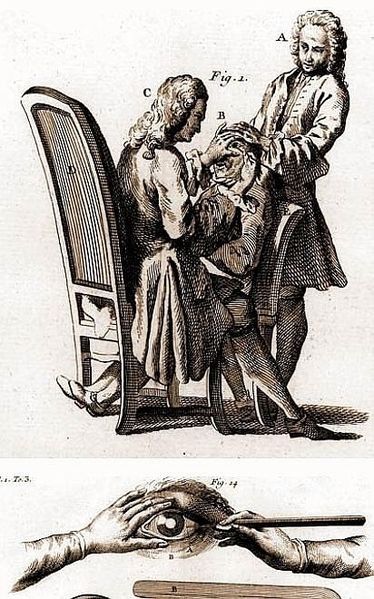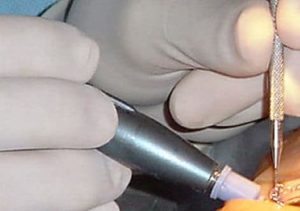Are Yucky Clinical Photos Destroying Your Medical Advertising?

Circa 1746
In any given week, we objectively review medical advertising and dozens of healthcare websites. And more than a few of them—for doctors, dentists and providers of all sorts—manage to sabotage their medical advertising effectiveness in a single stroke.
The poison? Those yucky photos of clinical procedures are a double-barrel emotional turn-off for prospective patients.
You’ll never hear about this from prospective patients because...well, they are the folks that never become patients. The detailed close-up illustration of dental implants, as a common example, have caused them to forgo or delay treatment. In addition, images that the patient sees as negative content will not be shared via social media except in a negative context.
We can't even show you the worst of them. But in a quick tour of bad medical advertising and websites, a would-be patient easily finds pictures, illustrations, and videos of medical procedures of common procedures such as cataract, carpal ligament, hip replacement, hand or foot surgery and other procedures.
Put patient perspective and emotions first…
 Do patients want to see the drill, screws and dental implant hardware in their mouth? It turns out that some doctors—or the inexperienced web builder who needed to fill a picture space on the website—didn’t consider the patient’s perspective first. Doctors tend to resonate to clinical images because that’s what they do.
Do patients want to see the drill, screws and dental implant hardware in their mouth? It turns out that some doctors—or the inexperienced web builder who needed to fill a picture space on the website—didn’t consider the patient’s perspective first. Doctors tend to resonate to clinical images because that’s what they do.
- In the mind’s eye of the clinician, it’s ordinary textbook stuff, no more alarming than a picture of cake batter in a cookbook recipe. But the surgeon’s perspective and value system is completely different from the patient's.
- Medical procedures, even relatively simple ones, include an element of fear for most patients. Avoid clinical images that, in the patient’s mind, engender anxiety.
- Judge your medical advertising first by the emotional perspective of the patient. A photo or illustration that could be a turn-off to a patient probably will be.
- Patients are buying results; they are not buying a procedure. Appropriate illustrations for medical advertising or website use include “after” or “benefit” images. In healthcare, people buy happiness.
- Don’t confuse medical advertising with “informed consent.” There’s a point in the patient’s decision-making process when informed consent is appropriate. The information and images in medical advertising—print ads, websites, etc.—do not satisfy that obligation.

Visuals belong in medical marketing…
To be clear, the visual elements of medical advertising can be powerful. Photos, illustrations, videos, animated GIFs and others communicate quickly and effectively. But our point is, the images that a patient regards as negative—yucky, in non-medical parlance—are counterproductive to your marketing goals.
For additional reading, see: Outcome Photos: Why Some Pictures Can Ruin your Message. And, for an independent, third-party assessment of your website, medical advertising materials, or your healthcare marketing plan, give us a call today at 800-656-0907, or you can begin the conversation right here.
Stewart Gandolf, MBA, CEO








